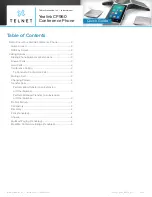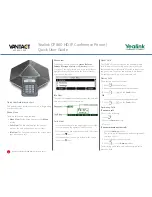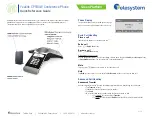
Mitel 6800 Series SIP Phone Release 4.2.0 Administrator Guide
4-31
ADVANCED NETWORK SETTINGS
You can set advanced network settings on the IP phone such as Network Time Protocol (NTP)
Time Servers, Virtual LAN (VLAN), and Quality of Service (QoS) using the Mitel Web UI or the
configuration files.
SIP AND TLS SOURCE PORTS
A System Administrator can configure the SIP and TLS source ports on the IP Phone.
Previously, the IP phone used default values (
5060
for UDP/TCP and
5061
for TLS). The two
new parameters for configuring the SIP and TLS source ports are:
•
sip local port
•
sip local tls port
You can configure the SIP and TLS source ports using the configuration files or the Mitel Web
UI.
After configuring these parameters, you must reboot the phone.
Configuring SIP and TLS Source Ports Using the Configuration Files
You use the following parameters to configure SIP and TLS ports:
•
sip local port
•
sip local tls port
For specific parameters you can set in the configuration files, see Appendix A, the sections:
•
“Local SIP UDP/TCP Port Setting”
on
page A-30.
•
“Local SIP TLS Port”
on
page A-31.
Note:
The available advanced network parameters via the IP phone UI are VLAN and
QoS only.
Notes:
1.
By default, the IP phones use symmetric UDP signaling for outgoing UDP SIP
messages. When symmetric UDP is enabled, the IP phone generates and listens
for UDP messages using port 5060.If symmetric UDP signaling is disabled, the
phone sends from random ports but it listens on the configured SIP local port. Refer
to
"Symmetric UDP Signaling‚" on page 29
for more information.
2.
The IP phones also use symmetric TLS signaling for outgoing TLS SIP messages
by default. When symmetric TLS is enabled, the IP phone uses port 5061 as the
persistent TLS connection source port. When symmetric TLS signaling is disabled,
the IP phone chooses a random persistent TLS connection source port for TLS
messages from the TCP range (i.e. 49152...65535) after each reboot regardless of
whether the parameter “sip outbound support” is enabled or disabled. Refer to
"Symmetric TLS Signaling‚" on page 30
for more information.
CONFIGURATION FILES
Summary of Contents for 6867i Premium
Page 1: ...Mitel 6800 Series SIP Phones 58014473 REV00 RELEASE 4 2 0 ADMINISTRATOR GUIDE ...
Page 21: ...Chapter 1 OVERVIEW ...
Page 52: ...Chapter 2 CONFIGURATION INTERFACE METHODS ...
Page 71: ...Chapter 3 ADMINISTRATOR OPTIONS ...
Page 154: ...Chapter 4 CONFIGURING NETWORK AND SESSION INITIATION PROTOCOL SIP FEATURES ...
Page 262: ...Chapter 5 CONFIGURING OPERATIONAL FEATURES ...
Page 579: ...Chapter 6 CONFIGURING ADVANCED OPERATIONAL FEATURES ...
Page 654: ...Chapter 7 ENCRYPTED FILES ON THE IP PHONE ...
Page 660: ...Chapter 8 UPGRADING THE FIRMWARE ...
Page 669: ...Chapter 9 TROUBLESHOOTING ...
Page 699: ...Appendix A CONFIGURATION PARAMETERS ...
Page 1003: ...Appendix B CONFIGURING THE IP PHONE AT THE ASTERISK IP PBX ...
Page 1007: ...Appendix C SAMPLE CONFIGURATION FILES ...
Page 1023: ...Appendix D SAMPLE BLF SOFTKEY SETTINGS ...
Page 1027: ...Appendix E SAMPLE MULTIPLE PROXY SERVER CONFIGURATION ...
Page 1042: ......
















































